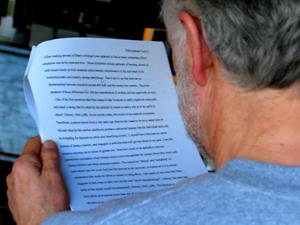
On advice from my friend Elizabeth, and as mentioned in my last post, I tried to take lunch hours this week. There’s a reason why they’re built into the 9-to-5 work day, after all. It makes sense to give ourselves a break for refueling on all levels: food for the body, relaxation for the brain, maybe some socializing for the soul.
From Tuesday on, I managed to get out of the house for my lunch hour around 5:00 p.m. Not exactly optimal, but still, I counted this as a step in the right direction. Elizabeth and I had been talking about how I can get at least one measly hour’s worth of fiction in each day during the week. Hence, a lunch hour.
The key is to actually leave my home and my WiFi. And, in fact, it did work even though my lunch hours occured so late in the day. I managed a few hours worth of fiction while sipping a nonfat, decaf latte in my favorite coffeehouse. And this helped my mood, yet…
Why did I still feel like crying sometimes? I don’t know what’s going to become of me. Honestly. I feel cornered by all the decisions I’ve made in my life that have landed me here: Knowing which work will truly make me happy, not knowing how I’m supposed to save for retirement and all that practical stuff…
So, though I’ve halted the descent down the depression slide, it’s still there, lurking. I still wonder how people with real lives — real career, kids, tons of responsibilities — get their novels written. Don’t they need tons of downtime to let the brain juices burble and sift? Maybe not. But I guess I do.







 Today’s signs of spring: Dog panting on our walk and me only wearing a hoodie over a long-sleeved cotton shirt.
Today’s signs of spring: Dog panting on our walk and me only wearing a hoodie over a long-sleeved cotton shirt.






